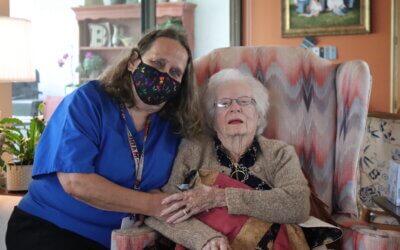Caring for a Dementia Patient: The 10 Most Important Tips for Family
A clinical nurse educator and a dietician with Chapters Health System share valuable advice for families who care for a dementia patient.
 Elderly couple, aged 75-80, looking for pieces of a jigsaw puzzle together in a private retirement home
Elderly couple, aged 75-80, looking for pieces of a jigsaw puzzle together in a private retirement home
Caring for a dementia patient is not easy. Dementia describes a range of neurological conditions affecting the brain and worsens over time. Changes in the brain cause nerve cells to stop working properly and eventually die. As a result, patients lose the ability to remember and think at levels required for daily life. Researchers have linked the changes in the brain to certain forms of dementia, but in most cases the changes causing dementia are unknown.
When caring for a dementia patient, it is important to know the different types of dementia. Alzheimer’s disease is the most common form. According to the Alzheimer’s Association, around 6.5 million Americans over the age of 65 live with the disease today. This number could increase to 13.8 million in 2060 if no medical breakthroughs are made. Like many forms of dementia, the condition is typically associated with buildups of specific proteins in the brain and a loss of connection among nerve cells.
Caring for a Dementia Patient at Home
The challenges families deal with when they care for a dementia patient are at times frustrating, confusing and heartbreaking. You may ask yourself; how can we make this easier? What do I need to do at home to keep my loved one calm and safe? A clinical nurse educator and dietician with Chapters Health System and explain 10 important tips for family.
1. Don’t Argue
“Arguing with a dementia patient is like trying to swim upstream,” said Cramer. “You exhaust yourself and don’t get anywhere.”
A dementia patient does not have the ability think and reason like we do. Arguing will only cause your loved one to get upset. If they want to travel somewhere, don’t explain why they can’t go. Make an excuse and divert their attention to a task. Tell them tickets are sold out and plan future activities with them for their “trip.” If they believe they need to go to work, tell them their boss called and said the office is closed for renovations or work was canceled on account of weather.
2. Allow Them Some Independence
Depending on the stage of dementia they are in, many patients can still perform daily activities without assistance. Let them. It’s important to involve your loved one as much as possible. For example, let them set the table at mealtime with the help of visual cues or dress independently after laying out their clothes. Giving a dementia patient a task not only keeps them occupied, but it also provides the mental and tactile stimulation that helps keep them calm.
3. Make a Safe Home
It’s crucial to keep a safe environment in the home. How you accomplish this is a little different, depending on the condition of your loved one. For a dementia patient, there are several actions you can take.
- Avoid scattered rugs and keep pathways clear of obstructions. Like many hospice patients, dementia patients face a serious fall risk. Keep walkers nearby to assist with mobility.
- Hide the car keys. Some patients with very early signs of Alzheimer’s disease may still drive safely in certain conditions. But as memory and decision-making skills decline, they need to stop. A driver with dementia cannot react quickly when faced with a surprise on the road.
- Feel free to give your loved one access to outdoor areas, but only if it is an enclosed space that prevents them from wandering or climbing. It’s amazing what someone is physically capable of when they are determined.
- Once again, take advantage of the resources available with your care provider. At Chapters Health, occupational and physical therapists are available to ensure the home environment meets the patient’s needs.
- For bathing, use a sturdy shower chair to support your loved one if they are unsteady.
4. Limit Napping
Avoid multiple or prolonged naps during the day. This can minimize the risk of throwing off a dementia’s patient’s biological clock. Many dementia patients have abnormal sleep patterns, making them tired during the day and restless at night. To help reduce this, avoid naps after lunchtime. This reduces the risk of them staying up and wandering late at night. A good night’s rest also makes tasks the following day easier to accomplish.
5. Set a Routine
Routine is important for people with dementia. A planned day allows you to spend less time trying to figure out what to do and more time on activities that provide meaning and enjoyment for the patient. Make sure the dementia patient bathes, dresses, eats and goes to sleep at the same time every day.
6. Make Mealtime Easier
Mealtime may seem like a simple task, but changes in spatial awareness, vision, attention and even temperature tolerances can make it an overwhelming experience for someone with dementia. Gabriella Belacastro, a dietician with Chapters Health shared these tips to help caregivers make it easier.
- Reduce distractions. Turn off the TV and serve meals in a quiet setting.
- Distinguish food from the plate. Changes in spatial and visual abilities make it difficult for dementia patients to distinguish food from the setting. It can help to use plates or bowls that have contrasting colors with the food and table setting. Avoid patterned dishes, tablecloths and placemats.
- Offer one food at a time. Don’t overwhelm your loved one with options by loading the plate and table. For example, serve them mashed potatoes followed by the main entrée.
7. Understand Sundowning
Individuals with dementia may experience a phenomenon known as sundowning. This is closely associated with the time when day turns to night. During this time, a patient can experience increased confusion, memory loss and feelings of anger. Symptoms include crying, agitation, pacing, fear, depression and restlessness. To reduce the risk of sundowning, stick to your patient’s routine and provide them with something that can occupy their attention, such as board games, puzzles and tasks.
8. Use Music
If your loved one can still communicate with you, ask them what music they listened to when they were young. Make a playlist of songs they remember from their youth. Also make sure to get comfortable headphones they don’t mind wearing for lengthy periods of time.
“It’s amazing how many people with dementia become their old self while listening to a song they remembered as one of their favorites,” shared Cramer.
In fact, a study from the University of Toronto found listening to meaningful music led to small changes in the brain’s neural pathways, suggesting improved memory performance among early Alzheimer’s patients.
9. Take Care of Yourself
“You can’t help the person you care for if you are wiped out,” said Cramer. “Being a primary caregiver for your loved one is exhausting.”
She is right. You can’t take care of a patient if you’re not taking care of yourself. Look into the resources your hospice or primary care provider has. At Chapters Health, respite care is one of four levels of care provided to hospice patients. Respite care’s sole purpose is providing caregivers a break, so they can focus on themselves and other priorities.
10. Try Not to Get Your Feelings Hurt
As your loved one’s dementia becomes more advanced, they get more confused and forgetful. That means they’ll sometimes forget who you are. That doesn’t mean they love you any less or forgot all the memories you’ve shared over the years. The older a memory is, the longer it stays with them.
“I read something from the wife of a man with Alzheimer’s who had a wonderful way of looking at this,” said Cramer. “She was sitting in a car with her husband who no longer remembered her. She lovingly touched his arm. He pulled away and said ‘I’m sorry miss. You are very nice, but I love my wife.’ Instead of being sad, this filled his wife with joy because he still remembered her.”
Chapters Health System is committed to serving the needs of its patients, families, caregivers, health providers, partners, and communities.
For more information, please call our helpful Chapters Health team at 1.866.204.8611 or Contact Us.
Keep Exploring

















